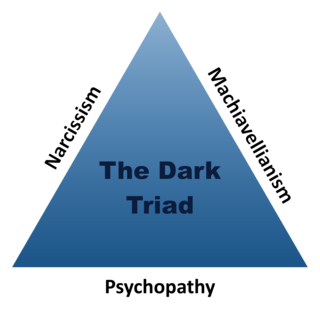Related Research Articles

Narcissistic personality disorder (NPD) is a personality disorder characterized by a life-long pattern of exaggerated feelings of self-importance, an excessive need for admiration, and a diminished ability to empathize with other people's feelings. Narcissistic personality disorder is one of the sub-types of the broader category known as personality disorders. It is often comorbid with other mental disorders and associated with significant functional impairment and psychosocial disability.

Otto Friedmann Kernberg is an Austrian-born American psychoanalyst and professor of psychiatry at Weill Cornell Medicine. He is most widely known for his psychoanalytic theories on borderline personality organization and narcissistic pathology. In addition, his work has been central in integrating postwar ego psychology with Kleinian and other object relations perspectives. His integrative writings were central to the development of modern object relations, a school within modern psychoanalysis.

Peter Pan Syndrome is a pop psychology term used to describe an adult who is socially immature. It refers to “never-growing” adults who have reached an adult age, but cannot face their adult sensations and responsibilities. The term is a metaphor based on the concept of not growing up and being trapped in childhood. Individuals with Peter Pan Syndrome display behaviours associated with immaturity and a reluctance to grow up. They have difficulties in social and professional relationships because of their irresponsible behaviours and narcissistic properties. While it has often only been associated with males in the past, it can affect anyone, regardless of sex or gender.
In law, an entitlement is a provision made in accordance with a legal framework of a society. Typically, entitlements are based on concepts of principle ("rights") which are themselves based in concepts of social equality or enfranchisement. It is the content of a subjective right, namely the claim of a legal subject as against other persons to a legal object.

Narcissism is a self–centered personality style characterized as having an excessive preoccupation with oneself and one's own needs, often at the expense of others.
Malignant narcissism is a psychological syndrome comprising a mix of narcissism, antisocial behavior, sadism, and a paranoid outlook on life. Malignant narcissism is not a diagnostic category defined in the Diagnostic and Statistical Manual of Mental Disorders (DSM-IV-TR). Rather, it is a subcategory of narcissistic personality disorder (NPD) which could also include traits of antisocial personality disorder, paranoid personality disorder and sadistic personality disorder.

The dark triad is a psychological theory of personality, first published by Delroy L. Paulhus and Kevin M. Williams in 2002, that describes three notably offensive, but non-pathological personality types: Machiavellianism, sub-clinical narcissism, and sub-clinical psychopathy. Each of these personality types is called dark because each is considered to contain malevolent qualities.

"The World Should Revolve Around Me" is the debut single of American pop-R&B duo Little Jackie. The song became a top-20 hit on the UK Singles Chart, and also peaked within the top 30 of the Irish Singles Chart. Upon its release, the song was met with a favorable reception from critics, who praised the song's Motown-esque production; however, some sociologists criticized the song, opining that it glamorized narcissism and demonstrated that the United States' narcissism is not declining. In the United States, the song appeared on the Billboard Pop 100, also appearing as the theme song for the VH1 reality TV series New York Goes to Hollywood.
In psychology, grandiosity is a sense of superiority, uniqueness, or invulnerability that is unrealistic and not based on personal capability. It may be expressed by exaggerated beliefs regarding one's abilities, the belief that few other people have anything in common with oneself, and that one can only be understood by a few, very special people. The personality trait of grandiosity is principally associated with narcissistic personality disorder (NPD), but also is a feature in the occurrence and expression of antisocial personality disorder, and the manic and hypomanic episodes of bipolar disorder.
The Narcissistic Personality Inventory (NPI) was developed in 1979 by Raskin and Hall, and since then, has become one of the most widely utilized personality measures for non-clinical levels of the trait narcissism. Since its initial development, the NPI has evolved from 220 items to the more commonly employed NPI-40 (1984) and NPI-16 (2006), as well as the novel NPI-1 inventory (2014). Derived from the DSM-III criteria for Narcissistic personality disorder (NPD), the NPI has been employed heavily by personality and social psychology researchers.
In psychology, manipulation is defined as subterfuge designed to influence or control another, usually in an underhanded manner which facilitates one's personal aims. Methods used to distort the individual's perception of reality may include seduction, suggestion, persuasion and blackmail to induce submission. Usage of the term varies depending on which behavior is specifically included, whether referring to the general population or used in clinical contexts. Manipulation is generally considered a dishonest form of social influence as it is used at the expense of others.
The concept of excessive selfishness has been recognized throughout history. The term "narcissism" is derived from the Greek mythology of Narcissus, but was only coined at the close of the nineteenth century.
Healthy narcissism is a positive sense of self that is in alignment with the greater good. The concept of healthy narcissism was first coined by Paul Federn and gained prominence in the 1970s through the research of Heinz Kohut and Otto Kernberg. It developed slowly out of the psychoanalytic tradition, and became popular in the late twentieth century.

Shmuel "Sam" Vaknin is an Israeli writer and professor of psychology. He is the author of Malignant Self Love: Narcissism Revisited (1999), was the last editor-in-chief of the now-defunct political news website Global Politician, and runs a private website about narcissistic personality disorder (NPD).
In social psychology, collective narcissism is the tendency to exaggerate the positive image and importance of a group to which one belongs. The group may be defined by ideology, race, political beliefs/stance, religion, sexual orientation, social class, language, nationality, employment status, education level, cultural values, or any other ingroup. While the classic definition of narcissism focuses on the individual, collective narcissism extends this concept to similar excessively high opinions of a person's social group, and suggests that a group can function as a narcissistic entity.
In psychology, narcissistic withdrawal is a stage in narcissism and a narcissistic defense characterized by "turning away from parental figures, and by the fantasy that essential needs can be satisfied by the individual alone". In adulthood, it is more likely to be an ego defense with repressed origins. Individuals feel obliged to withdraw from any relationship that threatens to be more than short-term, avoiding the risk of narcissistic injury, and will instead retreat into a comfort zone. The idea was first described by Melanie Klein in her psychoanalytic research on stages of narcissism in children.
Narcissistic defenses are those processes whereby the idealized aspects of the self are preserved, and its limitations denied. They tend to be rigid and totalistic. They are often driven by feelings of shame and guilt, conscious or unconscious.
In gender studies, the analysis of gender differences in narcissism shows that male narcissism and female narcissism differ in a number of aspects.

Jean Marie Twenge is an American psychologist researching generational differences, including work values, life goals, and social attitudes. She is a professor of psychology at San Diego State University, author, consultant, and public speaker. She has examined generational differences in work attitudes, life goals, developmental speed, sexual behavior, and religious commitment.

Ramani Suryakantham Durvasula is an American clinical psychologist, retired professor of psychology, media expert, and author. She has appeared on media outlets discussing narcissistic personality disorder and narcissistic abuse, including Red Table Talk, Bravo, the Lifetime Movie Network, National Geographic, and the History Channel, as well as programs such as the TODAY show and Good Morning America.
References
- ↑ Resnick, Brian (20 August 2015). "Donald Trump and the Political Benefits of a Narcissistic Personality". The Atlantic.
- ↑ Vedantam, Shankar (27 April 2008). "Clinton, Obama and the Narcissist's Tale". The Washington Post.
- 1 2 "About W. Keith Campbell".